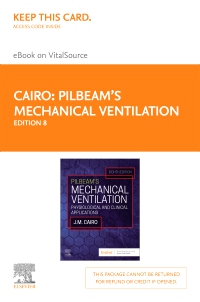
Pilbeam's Mechanical Ventilation - Elsevier eBook on VitalSource (Retail Access Card), 8th Edition
Elsevier eBook on VitalSource - Access Card

Ensure your students understand one of the most sophisticated areas of respiratory care with Pilbeam's Mechanical Ventilation: Physiological and Clinical Applications, 8th Edition! Known for its simple explanations and in-depth coverage of patient-ventilator management, this evidence-based text walks students through the most fundamental and advanced concepts surrounding mechanical ventilation and helps them understand how to properly apply these principles to patient care. This new edition is an excellent reference for all critical care practitioners and features coverage of the physiological effects of mechanical ventilation on different cross-sections of the population. Additionally, student-friendly features promote critical thinking and clinical application, such as key points, AARC clinical practice guidelines, critical care concepts, and updated learning objectives.
-
- UPDATED! Revised content throughout reflects the latest standards of respiratory care
- UNIQUE! Ventilator-Associated Pneumonia chapter presents in-depth, comprehensive coverage on this very challenging issue
- Critical Care Concepts present short questions that challenge students to apply knowledge learned to difficult concepts
- Brief patient case studies list pertinent assessment data and pose a critical thinking question to test students’ content comprehension
- Key Points draw attention to pivotal concepts and highlight important information as topics are addressed
- Intended for classroom or small group discussions, Clinical Scenarios offer a more comprehensive patient scenario that covers patient presentation, assessment data, and treatment options
- Logical sequencing of chapters builds on previously learned concepts
- Comprehensive Learning Objectives give students a clear, concise listing of what they need to learn in the chapter
- Bulleted end-of-chapter summaries help assess comprehension and guide study efforts
- Excerpts of Clinical Practice Guidelines developed by the American Association for Respiratory Care (AARC) are presented in a convenient, reader-friendly format
- Chapter outlines provide a "big picture" of the chapter content
- NBRC-style end-of-chapter review questions reinforce the very difficult concept of mechanical ventilation with practice that focuses on certification exam success
- Glossary of mechanical ventilation terminology provides definitions for highlighted key terms in each chapter
-
- UPDATED! Revised content throughout reflects the latest standards of respiratory care
-
1. Basic Terms and Concepts of Mechanical Ventilation
2. How Ventilators Work
3. How a Breath Is Delivered
4. Establishing the Need for Mechanical Ventilation
5. Selecting the Ventilator and the Mode
6. Initial Ventilator Settings
7. Final Considerations in Ventilator Setup
8. Initial Patient Assessment
9. Ventilator Graphics
10. Assessment of Respiratory Function
11. Hemodynamic Monitoring
12. Methods to Improve Ventilation in Patient-Ventilator Management
13. Improving Oxygenation and Management of Acute Respiratory Distress Syndrome
14. Ventilator-Associated Pneumonia
15. Sedatives, Analgesics, and Paralytics
16. Extrapulmonary Effects of Mechanical Ventilation
17. Effects of Positive Pressure Ventilation on the Pulmonary System
18. Troubleshooting and Problem Solving
19. Basic Concepts of Noninvasive Positive Pressure Ventilation
20. Weaning From and Discontinuation of Mechanical Ventilation
21. Long-Term Ventilation
22. Neonatal and Pediatric Mechanical Ventilation
23. Special Techniques Used in Ventilatory Support
Appendix
A Answer Key
B Review of Abnormal Physiological Processes
C Graphics Exercises




 as described in our
as described in our 